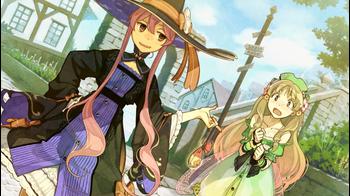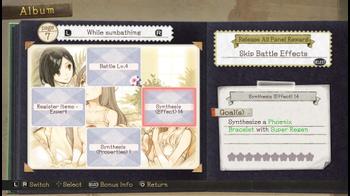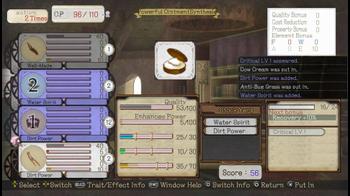
Atelier Ayesha Plus Review
After years of neglecting the series, I had the fortune of covering Atelier Escha & Logy last year for the site and it was my personal game of the year. For the longest time I was unsure whether the idea of what is essentially a game built around crafting would appeal to me considering I had basically hated the idea of it for as long as I have been playing games in this genre. I am sure this has kept a good number of other people away from the series, but once you accept the nature of the game it's a very relaxing experience.
I had passed on Atelier Ayesha when it first came out on the Playstation 3 here in America back in 2013, but after reading the announcement that the enhanced port would be localized for the Vita, and after loving its sequel, I was excited at the opportunity of playing it in its best form.
?Atelier Ayesha Plus is more than just a simple port. This version contains all of the original’s DLC along with new costumes, new missions, and new enemies, along with the ability to recruit Marion and Odelia into the player’s party. There is also the addition of a Hard difficulty level and even dual audio, a feature that went missing in the original Atelier Ayesha and ultimately ended up upsetting many fans. It's very much appreciated here considering the large amount of Japanese dubbing made even in the more pointless scenes - it's almost fully voiced in that regard.
The story in this game is simple. a young girl named Ayesha Altugle has taken over her grandfather’s herbal apothecary after his death and her sister Nio was mysteriously spirited away shortly afterwards. She now lives alone and works by making and selling medicine in order to support herself.
While visiting her sister’s grave in the nearby ruins where she was last seen, Nio’s phantom suddenly appears floating in the air. Seeing this as a sign that her sister is alive and motivated by a mysterious man who tells her to study the alchemy surrounding flowers, Ayesha sets out on an adventure to locate her whereabouts and bring her home. Along the way, she’ll do the RPG thing of meeting new friends and overcoming perilous odds. The events in this game set the stage for the rest of the Dusk mini-series that include Atelier Escha & Logy and Atelier Shallie.
Speaking of friends, with every milestone event Ayesha becomes involved in, new entries are added to her Memory Diary that is viewable inside her atelier room. These points don’t only provide deeper context, but also has some nice incentives like bonus experience points, increased stats, and even new recipes.
The only way to unlock these is to earn Memory Points that are obtained through activities like successful syntheses, completing quests, and fighting monsters. There is also an Album made up of pictures that are covered up by a grid, and by doing certain things and uncovering each panel in the grid, the player is able to to unlock new items such as weapons, costumes, and new gameplay systems like being able to switch party members instead of having to run up and recruit them out in the world.
Like the other games in the series, there is a time restriction put in place making you accomplish the missions given to you in a timely manner. What I had a difficult time coming to terms with is how The Alchemist of Dusk gives you a three-year limit to rescue Nio. If you save her early, you use the extra time at your disposal.
You would think this amount of freedom would work out fine, but I had gotten so caught up with doing all of these different quests and character missions that before I knew it I had used up all of the time I had and was forced to start the game all over - though I guess some of the blame is on my for not making multiple saves.
It’s this rigid structure that made me practically paranoid in my second playthrough, keeping a close eye on the time I was spending doing anything from traveling across the overworld to even harvesting items. It made me appreciate the advancements the sequel had made in breaking everything down into much smaller increments.
The alchemy system could still use a little work, although like Atelier Rorona Plus, it has been greatly simplified and had many of its more frustrating elements removed like failing a mixture and watching all of your precious items burn up.
Filling panels in the Album can unlock items and change gameplay mechanics. The problem is that I still find myself moving things around and switching between different special skills that affect the synthesis without any clear idea what I was doing. There is a lot of nuance that may confuse some impatient players, but I still find the whole mechanic fascinating. Like I said before, it made me love crafting.
The biggest problem Atelier Ayesha Plus is the engine’s performance. While in town or really around an area with a small crowd, the game really starts to chug. Thankfully, I didn’t really notice that while out in the field and during battles. The smaller screen also enhances the visuals of the game as well, giving character models and environments a cleaner and more beautiful look. And of course, since this is made by Gust, the soundtrack is absolutely incredible all the way down to the battle music.
Ultimately, Atelier Ayesha Plus isn’t that big a leap from its initial outing, but the changes made and the extra layer of polish over everything is very welcome and it makes me happy knowing my patience paid off. I am still a big fan of how modest the Atelier series is, avoiding the often forced grand scale view of its contemporaries.
Sometimes its nice just to focus on the fun day-to-day things, all the while appreciating the effort the developers put into character development and more importantly the deep and enjoyable alchemy system. Plus, Linca is in it, and Linca is always great.


